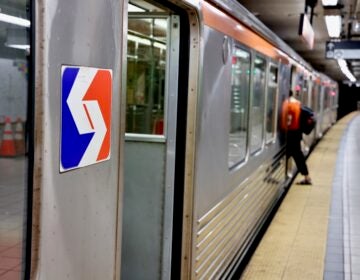Judge orders full restoration of SEPTA service, but fare increase can continue
A consumer rights activist and two other riders sued SEPTA, calling the service cuts discriminatory and saying the agency exaggerated the crisis to lobby for more funding.

File - Philadelphians board the 32 bus. (Kimberly Paynter/WHYY)
From Philly and the Pa. suburbs to South Jersey and Delaware, what would you like WHYY News to cover? Let us know!
A Philadelphia judge on Thursday directed SEPTA to immediately reverse all service cuts imposed last month, though she permitted the agency to proceed with planned fare increases.
The ruling, issued by Judge Sierra Thomas-Street of the Court of Common Pleas, requires SEPTA to restore in full the services that were curtailed — including the 32 bus routes eliminated and 16 routes shortened — without delay. The injunction also bars any further service reductions.
“This is a huge victory for the people who ride SEPTA every day,” said Lance Haver, a longtime consumer advocate. Haver is also one of the plaintiffs in a lawsuit that challenged the cuts.
“It should send a message directly to the governor that we need a resolution, that we need the budget passed, and that SEPTA will need additional funding at some point in the future,” he said.
The order did not prohibit SEPTA from enacting a previously scheduled fare hike. Haver said he hadn’t made a decision on next steps nor whether he and the other plaintiffs would challenge the new fares.
The original lawsuit was filed by attorney George Bochetto on behalf of Haver and two other riders. The suit argued that the cuts and fare hikes disproportionately burden Black, Latino and low-income riders, while sparing Regional Rail routes that predominantly serve wealthier suburban commuters. The plaintiffs further contend that SEPTA has manufactured a fiscal crisis to pressure state lawmakers into granting more funding.
SEPTA had rejected those claims, pointing to an equity analysis and a public review process it said complied with federal requirements. SEPTA has cited a $213 million operating deficit for the current fiscal year, the result of a state budget that is now more than two months overdue due to legislative gridlock between the Democrat-controlled House and Republican-controlled Senate. Public transportation funding remains one of the areas on which the two sides are still far apart.
SEPTA officials said that the legislative inaction in Harrisburg forced them to enact the austerity plan — including fare hikes and system-wide reductions. However, Haver and the plaintiffs also accused the agency of misrepresenting its financial condition.
“That is a complete fiction that SEPTA was trying to use to turn the riders into pawns in SEPTA’s game,” Haver said. “Here’s the facts: SEPTA projects having $400 million at the end of this fiscal year, even if they don’t get a penny of additional money from Harrisburg. On top of that, SEPTA has a $100 million line of credit at PNC Bank. There is no possible way, based on this judge’s ruling, that SEPTA will deplete the stabilization fund.”
SEPTA officials were not immediately available to respond to the court’s ruling.
Bochetto also argued this week that the hold on new cuts meant SEPTA also could not eliminate Sports Express Trains from the B, formerly known as the Broad Street Line, for tonight’s Eagles home game at Lincoln Financial Field, as was planned as part of the earlier round of cuts.
That issue was made moot Wednesday when the sports-betting website FanDuel announced a gameday sponsorship to resume the express trains and cover the cost of fares for fans after the game.
Some of the earlier service cuts were also reversed last week when SEPTA agreed to restore some SEPTA bus routes most used by students by spending its subsidy from the city sooner than planned. Uber also began offering free rides to Philadelphia seniors in response to the service cuts.
SEPTA said it would cancel and reverse the cuts and fare hikes if Gov. Josh Shapiro and state legislators make a budget agreement that includes sufficiently higher transit funding.
Shapiro said Tuesday that budget negotiations were continuing, but it remains unclear when a deal might be forthcoming. The state Senate was set to return from a break Thursday.
Haver said the path forward is straightforward.
“The state legislature and the governor have to do what they’re legally mandated to do — pass a budget,” he said. In the meantime, he added that SEPTA should draw from its stabilization fund “as a stopgap until the governor and the state legislature do what they’re supposed to do.”

Get daily updates from WHYY News!
WHYY is your source for fact-based, in-depth journalism and information. As a nonprofit organization, we rely on financial support from readers like you. Please give today.





